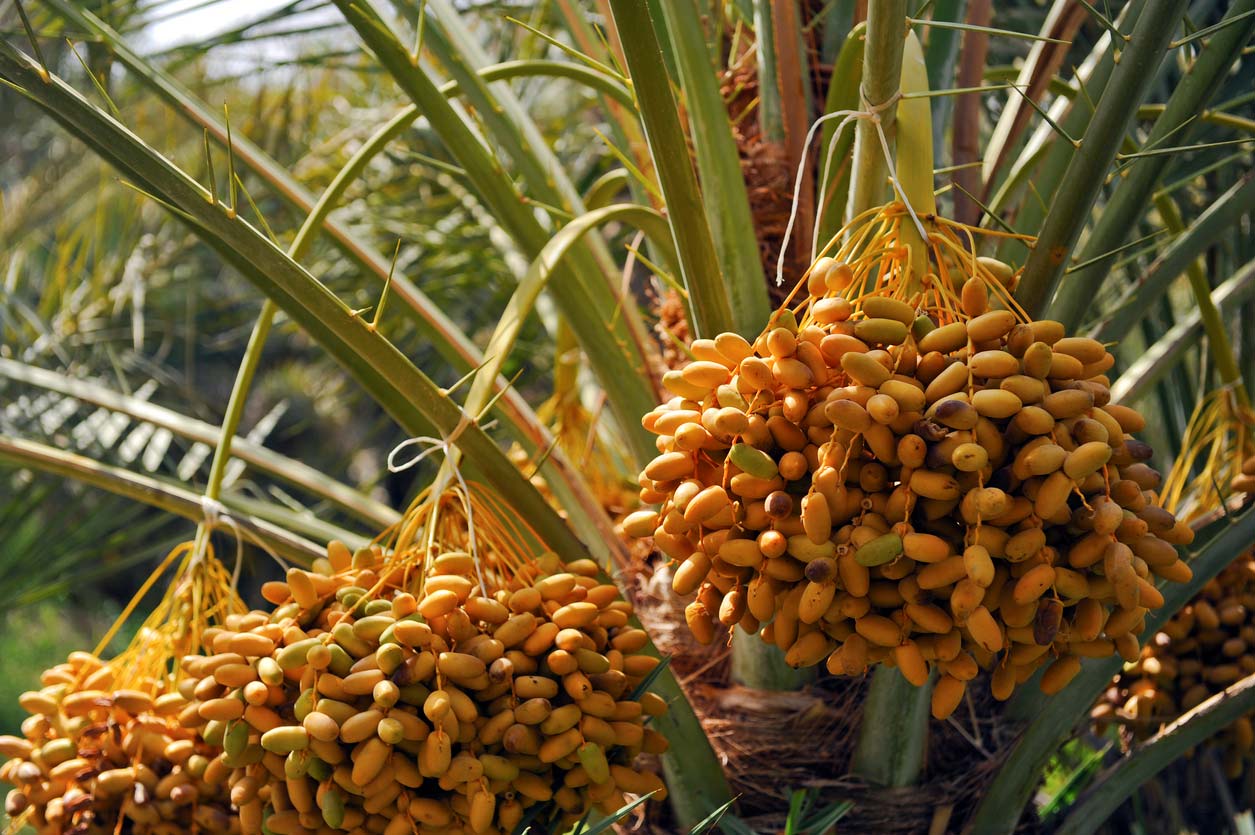Dates are the fruit of the date palm or Phoenix dactylifera.
The scientific name refers to the plant’s ability to spring to life from the searing heat of the desert like its mythological namesake bird, the phoenix, that rises from the ashes to live again.The date is a one-seeded fruit, or drupe, like a peach or nectarine. Typically oblong, dates can vary significantly in shape, size, color, quality, and consistency of flesh. Dates that are ready to eat are generally brownish in color, and their taste depends on their ripeness.
Date palms are native to the Persian Gulf area of the Middle East, but they are also grown in many other warm or tropical climates. Egypt is the world’s largest producer of dates, although Iran, Algeria, Saudi Arabia, and the United Arab Emirates are major producers as well. The US produces a small amount in comparison (roughly 4% of Egypt’s crop), with most of the US harvest coming from California.
In addition to being naturally sweet and full of nutrition, dates also offer an array of benefits to your health and the environment. If you’re on the fence about including dates in your diet, consider what the following research says about their positive impacts.
Health Benefits of Dates

1. Dates can support faster labor and delivery during pregnancy.
I’m not sure how they came up with the idea, but apparently, some researchers woke up one day and thought, “Can dates speed up labor?” Actually, the question makes sense when you consider that giving birth is pretty much the most grueling endurance sport there is. Triathletes consume energy gels, bars, and drinks during their races, but so far, nobody has marketed “Birth Bars” to someone in labor.
In their 2017 study, Iranian researchers found that 91 women who consumed dates late in their pregnancy, beginning in the 37th week, experienced shorter labor duration and a reduced need for oxytocin to accelerate the labor process. The benefits were seen after eating the equivalent of eight to nine dates daily.
A similar study found that women who consumed dates daily for four weeks toward the end of their pregnancy were much more likely to experience spontaneous labor. (“Spontaneous” here means labor wasn’t induced by drugs like oxytocin and prostaglandin or via c-section; not that the baby came out prior to full-term.) The date-eating mothers also had a significantly higher mean cervical dilatation (3.5 cm vs. 2 cm) upon admission compared to women who did not eat dates. And check out the difference in length of the first stage of delivery between the date eaters and the controls: 8.5 vs. 15.1 hours. That’s almost the entire first season of Bridgerton!
Dates have also been shown to boost the production of the hormone prolactin, which is needed for the production of breast milk.
2. Dates may protect your heart health.
A 2009 comparative study examined the impacts of eating Medjool and Hawaiian varieties of dates on heart health biomarkers. The authors found that eating 100 grams of dates (around 12 dates) per day for four weeks, especially Hawaiian types, improved serum triglycerides and oxidative stress. Despite their high natural sugar content, dates didn’t negatively affect blood sugar levels or blood fats, which led the authors to determine them to be anti-atherogenic, or helpful for preventing plaque buildup in arteries that can lead to heart disease.
Other research has found dates beneficial for reducing high blood pressure and high cholesterol. They may also improve the concentration of antioxidants in your blood, which can help protect against oxidative stress and inflammation that can be harmful to heart, and overall, health.
3. Dates may support healthy blood sugar management.
A 2020 review published in the journal Foods discusses how dates contain antioxidant compounds that support healthy insulin sensitivity and blood glucose control that can be beneficial for people with diabetes. Other research suggests that, despite their sweetness, dates contain compounds that can be helpful in the nutritional management of diabetes and other insulin-resistant conditions.
4. Dates may protect against toxins and carcinogens.
Lab studies observed the ability of date fruits to prevent cellular mutations after exposure to Salmonella. Other studies have found that the antioxidants in dates can fight off free radicals that can cause oxidative damage that leads to cancer. Furthermore, animal studies have shown that dates may even have anti-tumor characteristics, though the mechanism isn’t entirely understood.
5. Dates are anti-inflammatory and antimicrobial.
Dates appear to have an antimicrobial and anti-inflammatory effect that enables them to help prevent disease. Some studies have shown that date fruits can reduce swelling and inflammation biomarkers in the body. Additionally, date extract, particularly from the leaves and pits, have been shown to help fight off a number of viruses, fungi, and bacterial strains in lab studies.
Environmental Benefits of Dates

1. Dates can be zero-waste fruits.
Date palms produce much more than just their sweet fruits. The main components of date palm biomass are the structural and fibrous compounds cellulose, hemicellulose, and lignan that can be utilized in other ways. For instance, date palm biomass can be used to make biofertilizers, biofuels, and fuel pellets that can be used in place of coal in power plants and other industries. Date palm fibers and other biomass may even be used to make paper, transportation fuels, and heating energy.
Of course, just because it can be done doesn’t always mean it is. For instance, Oman practices a zero-waste growing system. But Saudi Arabia does not — instead opting to burn date palms, which causes air pollution.
2. Date palm fibers can remove toxic metals from the environment.
Some research shows that date palm fibers can absorb heavy and toxic metals, like lead, in the environment. Some scientists recommend that date palm waste be used for this purpose, as it’s a practical and low-cost solution to metals accumulating in the environment from industries like batteries, petrochemicals, and newspapers.
3. Date palms are naturally hardy and drought-resistant.
Date palms are pretty well suited to growing in arid climates with hot summers. As climate change heats up the world, this could make them increasingly popular in areas like the Middle East and the western US, where water can be scarce.
Downsides to Eating Dates

Dates are packed with flavor and nutrition, but that doesn’t mean they come without potential considerations.
Some people may experience gastrointestinal issues, like bloating, as a result of the fruit’s high sugar and fiber content. If you’re not used to eating dates, it’s probably a good idea to start with just one to make sure your body responds well to it.
Because dates are calorically dense and have a high sugar content, they may also contribute to unwanted weight gain if they become a major diet staple. Just one date can add around 70 calories to your diet, so keep this in mind if you’re monitoring overall energy intake.
Some commercial dried dates may contain sulfites — compounds that can trigger allergic reactions or asthma in some people. Keep this in mind, especially, if you’ve ever experienced a reaction to other dried fruits. Allergy symptoms may include bloating, diarrhea, stomach pain, and even a skin rash in some people. Fortunately, sulfite-free dates are widely available.
Lastly, the high sugar content of dates makes them a potential factor in promoting tooth decay. This is less likely to be a risk if you practice regular oral hygiene.






Комментариев нет:
Отправить комментарий